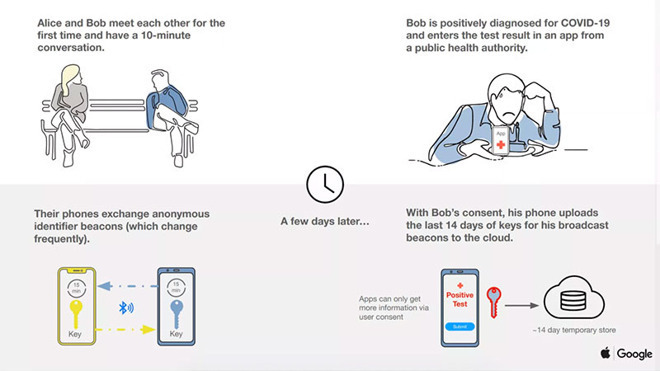Apple and Google are reportedly in a standoff with the UK's National Health Service due to its specific plans for mobile contact tracing.
On Friday, the two tech firms announced a joint venture to build out a privacy-protecting and Bluetooth-based development framework that health organizations could use to build apps to track and curb the spread of coronavirus.
As part of its privacy protocols, Apple and Google are requiring health organizations avoid a centralized database of user data. That's something the NHS's digital arm, the NHSX, originally planned to do with its app, The Guardian reported.
The API, as it's designed, is meant to track whether a person has come into contact with someone infected with COVID-19. The decentralization protocol is meant to prevent governments from building a surveillance system to track the movements of people on a wider scale.
But if an app doesn't adhere to Apple and Google mandates, it won't be able to take advantage of the benefits. Instead, it will face severe limitations. Without the Apple and Google API, an app is only able to access Bluetooth when it's actually running in the foreground, requiring an app's display to stay unlocked and on to work properly.
Those measures are meant as a privacy safeguard to protect against apps surreptitiously tracking users without their consent.
Prior to the Apple and Google announcement, the NHSX has been hopeful that smartphone makers would lift those restrictions for contact tracing apps.
It's a similar problem that Singapore's TraceTogether app ran into — its Bluetooth tracking didn't work in the background. Reportedly, only 12% of Singapore's population had downloaded the app, far below the 60% many experts say is required for it to be effective.
For its part, the NHSX denied claims of a "standoff" with the tech giants.
"This suggestion is completely wrong. Everyone is in agreement that user privacy is paramount, and while our app is not dependent on the changes they are making, we believe they will be helpful and complementary," a spokesperson said.
 Mike Peterson
Mike Peterson







-m.jpg)






 Christine McKee
Christine McKee
 Wesley Hilliard
Wesley Hilliard
 Malcolm Owen
Malcolm Owen
 Andrew Orr
Andrew Orr
 William Gallagher
William Gallagher
 Sponsored Content
Sponsored Content









11 Comments
Seems a lot smarter to avoid a centralised database. The Apple/Google method seems to provide the same facility to inform users they have been close to an infected individual, without tracking the entire population. Considering there seem to be no downsides to the Apple/Google method, the only conclusion here is that the NHSX wants to used this as a backdoor to track individuals at a whim.
In fact this doesnt really even need the involvement of government. Apple and Google could release this and the NHSX would be pushed aside and pretty much forced to use this data instead.
Government’s (USA,UK) would really like a tracker implanted in people’s skull (exaggerating in 2020, but maybe not in 2030).
... with expansion capabilities to hearing people’s thoughts.
I remember the FBI director giving a lecture on this a few years back (reading thoughts, not the implant).
I wasn’t able to find it. But here’s something similar:
Apple and Google creating a freedom friendly framework, is a very good thing.
The whole idea of tracking possibly infected people is appalling. It doesn't matter if it is Apple or some government, nothing good will come for this. Beyond that I really believe that governments in general have gone absolutely nuts with their response to the Wuhan virus. In simple terms the rights of a few are being given excess sway over the population in general. The few here being the medical profession that wants the lock down to make their life a bit easier.